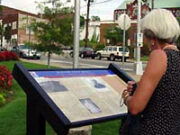The impact of the Civil War (1861-65) on Georgia was greater than that of any other event before or since. Some 11,000 Georgians were killed between 1861 and 1865, and more than 460,000 enslaved African Americans were emancipated by the war’s end. The nonprofit organization Georgia Civil War Heritage Trails (GCWHT) chronicles the Civil War era through historic driving routes and interpretive markers, patterned after Virginia’s “heritage tourism” initiative. GCWHT, a tax-exempt corporation founded in 1999 and led by volunteers from throughout the state, works to raise public awareness of existing preservation opportunities while providing scenic and cultural benefits to those who follow its trails.
Another goal of GCWHT is to stimulate economic development in Georgia. With funds awarded by the federal government under the Transportation Equity Act for the Twenty-first Century, and with the support of scores of local communities, GCWHT has erected highway directional signs and a series of interpretive markers at many locations along or near some of the routes used by the Union and Confederate armies. Trails bypass interstate highways, instead leading visitors through rural counties. Communities along or near each trail benefit from this increased tourism.
The content of every marker is thoroughly checked by representatives of the National Park Service, the Georgia Park Service, academics, and local historians; documentation for all content is required. GCWHT markers include a map, photographs, and/or Civil War–era drawings. Most are installed adjacent to existing public parking; GCWHT coordinates with the Georgia Department of Transportation and with local jurisdictions and landowners to build adequate parking if none is nearby.
GCWHT divides the state into six distinct “trail regions,” each representing a geographical area and/or a significant event from the Civil War period. Because the Atlanta campaign and the March to the Sea were two major Civil War events in Georgia, these trails were created first. Interpretive markers feature not only military campaigns but also such nonmilitary topics as the roles of women and African Americans, hospitals, churches, railroads, and many other social and political subjects from the era. Each marker is linked along a trail route to national and state parks, museums, and other Civil War heritage attractions.




